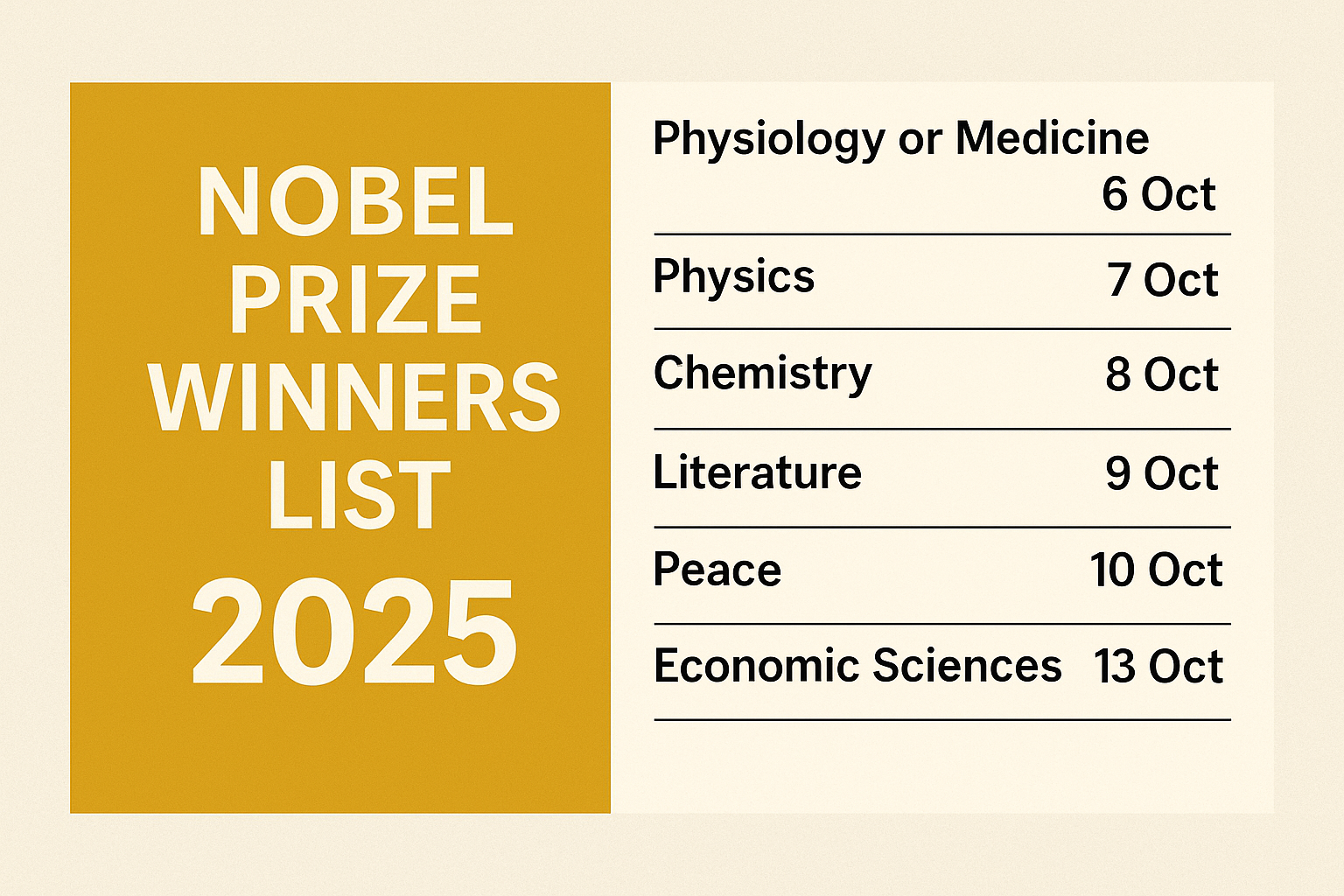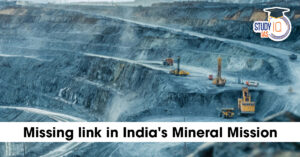Table of Contents
Every year, the Nobel Prizes celebrate humanity’s most significant advances in science, literature, peace, and economics. In 2025, laureates from around the world were honoured for discoveries and contributions that push the boundary of knowledge and human welfare.
Here’s a complete breakdown of the Nobel Prize Winners List 2025, category by category, with key insights into their work and significance.
Nobel Prize 2025 Winners List (Category-wise Updates)
Here’s the complete category-wise list of Nobel Prize 2025 Winners, which will be updated as new results are announced.
| Category | Date | Winners (2025) | Awarded For |
|---|---|---|---|
| Physiology or Medicine | October 6, 2025 | Mary E. Brunkow (USA), Fred Ramsdell (USA), Shimon Sakaguchi (Japan) | For discovering regulatory T cells — immune system cells that prevent our body from attacking itself, paving the way for treatments for autoimmune diseases and cancer. |
| Physics | October 7, 2025 | John Clarke (University of California, Berkeley), Michel H. Devoret (Yale University and UCSB), and John M. Martinis (UCSB) | For their groundbreaking discovery of macroscopic quantum mechanical tunnelling and energy quantisation in an electric circuit. |
| Chemistry | October 8, 2025 | Susumu Kitagawa, Richard Robson, and Omar M. Yaghi | For the development of metal-organic frameworks (MOFs). |
| Literature | October 9, 2025 | László Krasznahorkai (Hungary) | For his compelling and visionary oeuvre that, in the midst of apocalyptic terror, reaffirms the power of art. |
| Peace | October 10, 2025 | María Corina Machado (Venezuela) | For her tireless work promoting democratic rights for the people of Venezuela and her struggle for a peaceful transition from dictatorship to democracy. |
| Economic Sciences | October 13, 2025 | To be announced | To be announced |
Note: The article will be updated daily as the Nobel Week 2025 announcements continue.
Nobel Prize in Medicine 2025
Laureates: Mary E. Brunkow, Fred Ramsdell, Shimon Sakaguchi
Awarded for: Discoveries concerning peripheral immune tolerance
In 2025, the Nobel Prize in Physiology or Medicine was awarded jointly to Mary Brunkow, Fred Ramsdell, and Shimon Sakaguchi for groundbreaking work on how the immune system prevents it from attacking the body’s own healthy tissues — a phenomenon known as immune tolerance.
Their research elucidated how regulatory T cells (Tregs) act as the immune system’s “brakes,” suppressing potentially harmful immune responses and preventing autoimmune disease. The gene FOXP3 emerged as a central biomarker and functional switch in Treg biology.
This discovery not only deepens our understanding of immune regulation, but also holds promise for therapeutic modulation in autoimmune diseases, transplant rejection, and cancer immunotherapy.
Nobel Prize in Physics 2025
Laureates: John Clarke, Michel H. Devoret, John M. Martinis
Awarded for: Macroscopic quantum mechanical tunnelling & energy quantisation in an electric circuit
The 2025 Nobel Prize in Physics honors the trio who brought quantum mechanics out of the microscopic realm into engineered circuits. Their experiments in superconducting circuits using Josephson junctions showed that collective quantum behavior and quantum tunnelling can occur at scales visible to the human eye.
They also demonstrated energy quantisation — that discrete energy levels exist in these engineered circuits. This work lies at the backbone of quantum computing, quantum sensors, and superconducting qubit technologies.
Nobel Prize in Chemistry 2025
Laureates: Susumu Kitagawa, Richard Robson, and Omar M. Yaghi
Awarded for: For the development of metal-organic frameworks (MOFs).
What they discovered & its importance:
-
Metal-organic frameworks are crystalline structures built from metal nodes and organic linkers, creating highly porous networks.
-
These frameworks can trap gases (e.g. CO₂), capture pollutants, store hydrogen, filter water, or even extract moisture from air (sorb water) — making them very promising for energy, environment, and materials applications.
-
Their work has opened new pathways for designing materials with custom porosity, selectivity, and chemical function.
Nobel Prize in Literature 2025
Laureate: László Krasznahorkai (Hungary)
Why he won: For his compelling and visionary oeuvre that, in the midst of apocalyptic terror, reaffirms the power of art.
What his body of work is about:
-
Krasznahorkai is known for dense, philosophically rich prose, often exploring themes of existential dread, societal collapse, and the endurance of human meaning amid chaos.
-
His works, such as Satantango (1985), have been lauded for their stylistic boldness (sometimes extremely long sentences), their visionary perspective, and their existential weight.
-
The Swedish Academy praised that his writing, even in “apocalyptic terror,” reaffirms the possibility and necessity of art in human life.
Nobel Peace Prize 2025
Winner: María Corina Machado (Venezuela)
Contribution: For her tireless work promoting democratic rights for the people of Venezuela and her struggle for peaceful transition from dictatorship to democracy.
The Norwegian Nobel Committee lauded Machado’s courage and perseverance in defending democracy despite repression and personal threats.
“Her unwavering commitment symbolizes hope for millions striving for freedom and justice,” said Jørgen Watne Frydnes, Chair of the Nobel Committee.
Nobel Prize in Economic Sciences 2025
The Nobel Prize in Economic Sciences, technically the “Sveriges Riksbank Prize in Economic Sciences in Memory of Alfred Nobel,” will wrap up the Nobel season on October 13, 2025.
The prize recognizes economists whose contributions have enhanced our knowledge of global markets, development, inequality, and sustainable growth.
Previous recipients have been specialists in behavioral economics, global poverty, and climate finance — all important themes for crafting future economies.
About the Nobel Prizes
The Nobel Prizes were founded in 1901, according to the will of Swedish chemist, inventor, and industrialist Alfred Nobel, most famous for his invention of dynamite. Nobel had a dream of honoring those who “have conferred the greatest benefit to humankind.”
The Six Nobel Categories:
-
Physics – For discoveries about the universe and natural laws.
-
Chemistry – For advancements in chemical science.
-
Physiology or Medicine – For breakthroughs improving human health.
-
Literature – For exceptional literary work.
-
Peace – For efforts toward global harmony and conflict resolution.
-
Economic Sciences – Added later in 1968, recognizing excellence in economics.
Each Nobel Laureate receives:
🏅 A Gold Medal
📜 A Diploma
💰 A Cash Prize worth around 11 million Swedish kronor (approximately ₹1.03 crore)
The ceremonies are held annually in Stockholm, Sweden, except for the Peace Prize, which is awarded in Oslo, Norway.
The Legacy of Alfred Nobel
Alfred Nobel (1833–1896) was not only an inventor but also a visionary who wanted to strike a balance between science and morality. Having read an incorrect obituary that referred to him as the “merchant of death” due to his invention of explosives, Nobel decided to leave behind a legacy that honored peace and progress.
His act of giving away his wealth to establish the Nobel Prizes revolutionized the way that the world rewards human achievement — and makes it one of history’s greatest acts of hope and redemption.
Why the Nobel Prize Matters
The Nobel Prize stands as the highest recognition of human brilliance and compassion. It:
-
Encourages innovation and creativity.
-
Honors individuals whose work benefits humanity.
-
Inspires generations of scientists, writers, and peacebuilders.
-
Highlights the power of knowledge to solve global challenges.
Every Nobel season reminds the world that even in times of conflict and uncertainty, human curiosity and courage continue to push the boundaries of possibility.
UPSC & Academic Relevance
For UPSC and competitive exam aspirants, the Nobel Prize Winners 2025 are highly relevant under Current Affairs, Science & Technology, International Relations, and Ethics.
Possible questions include:
-
Explain the significance of regulatory T cells in immune tolerance.
-
Discuss the role of the Nobel Peace Prize in international diplomacy.
-
Write a short note on the contribution of the Nobel Prize to global scientific advancement.
Conclusion
Nobel Prize season 2025 is another milestone in the celebration of human achievement. From cracking the code of our immune system to writing books that shape our souls, these prizes celebrate the way knowledge, creativity, and empathy propel civilization forward.
Throughout the week, additional laureates will come to join this illustrious roll call — each one reminding us that progress, in all its forms, is the greatest legacy we can build.


 World Summit on Disaster Management (WSD...
World Summit on Disaster Management (WSD...
 Domestic Systemically Important Banks (D...
Domestic Systemically Important Banks (D...
 The Missing Link in India’s Critical M...
The Missing Link in India’s Critical M...

























